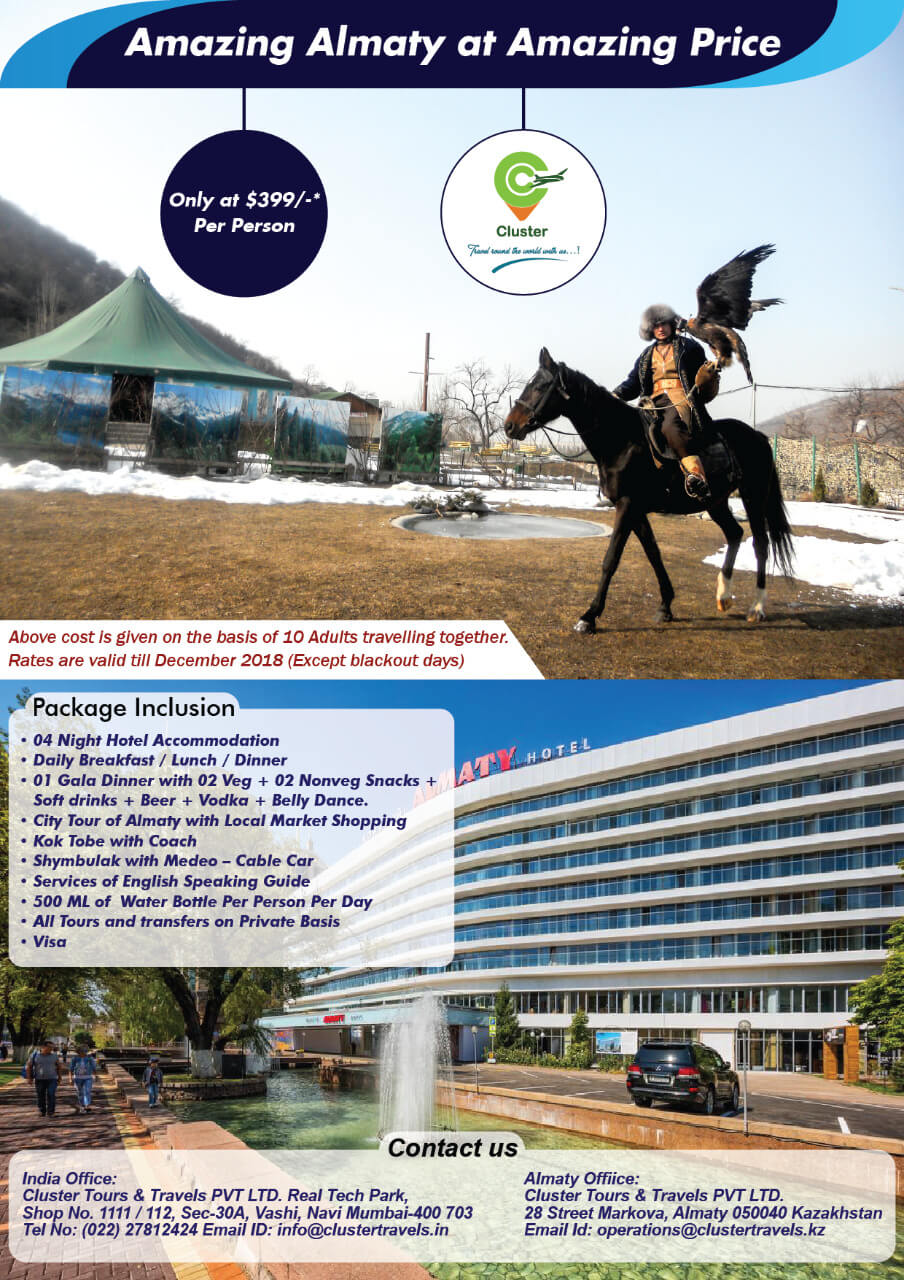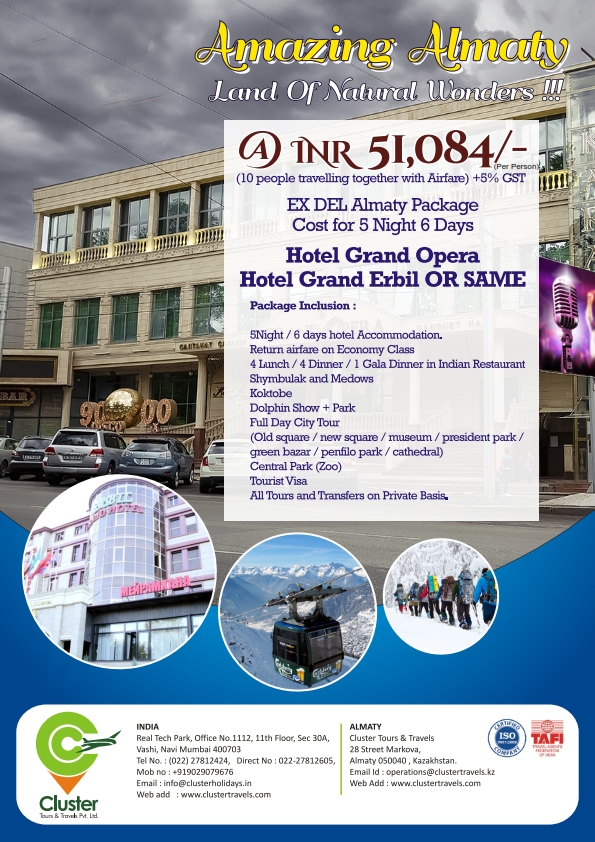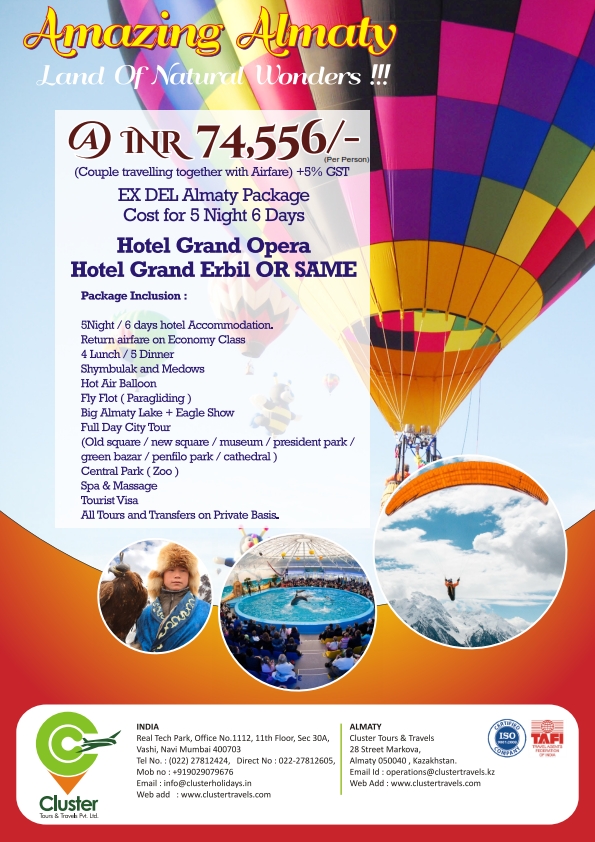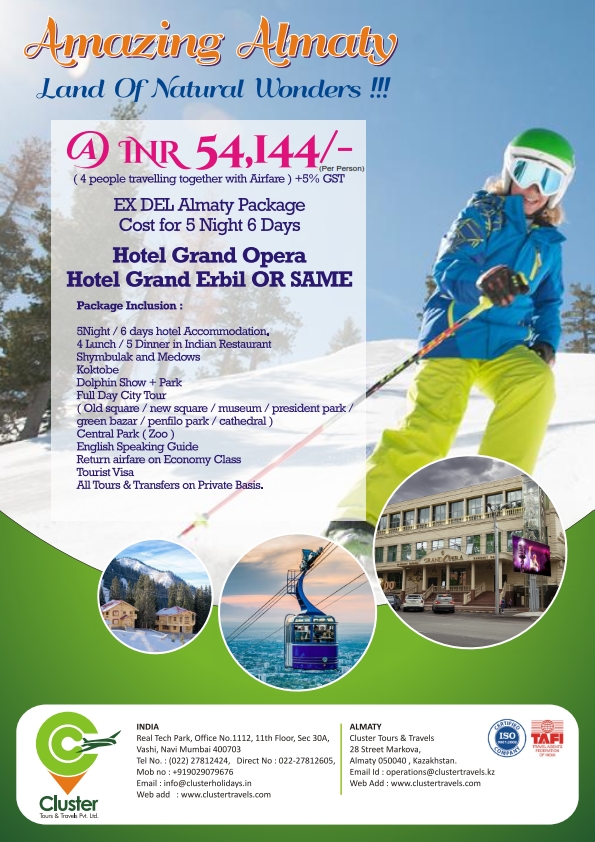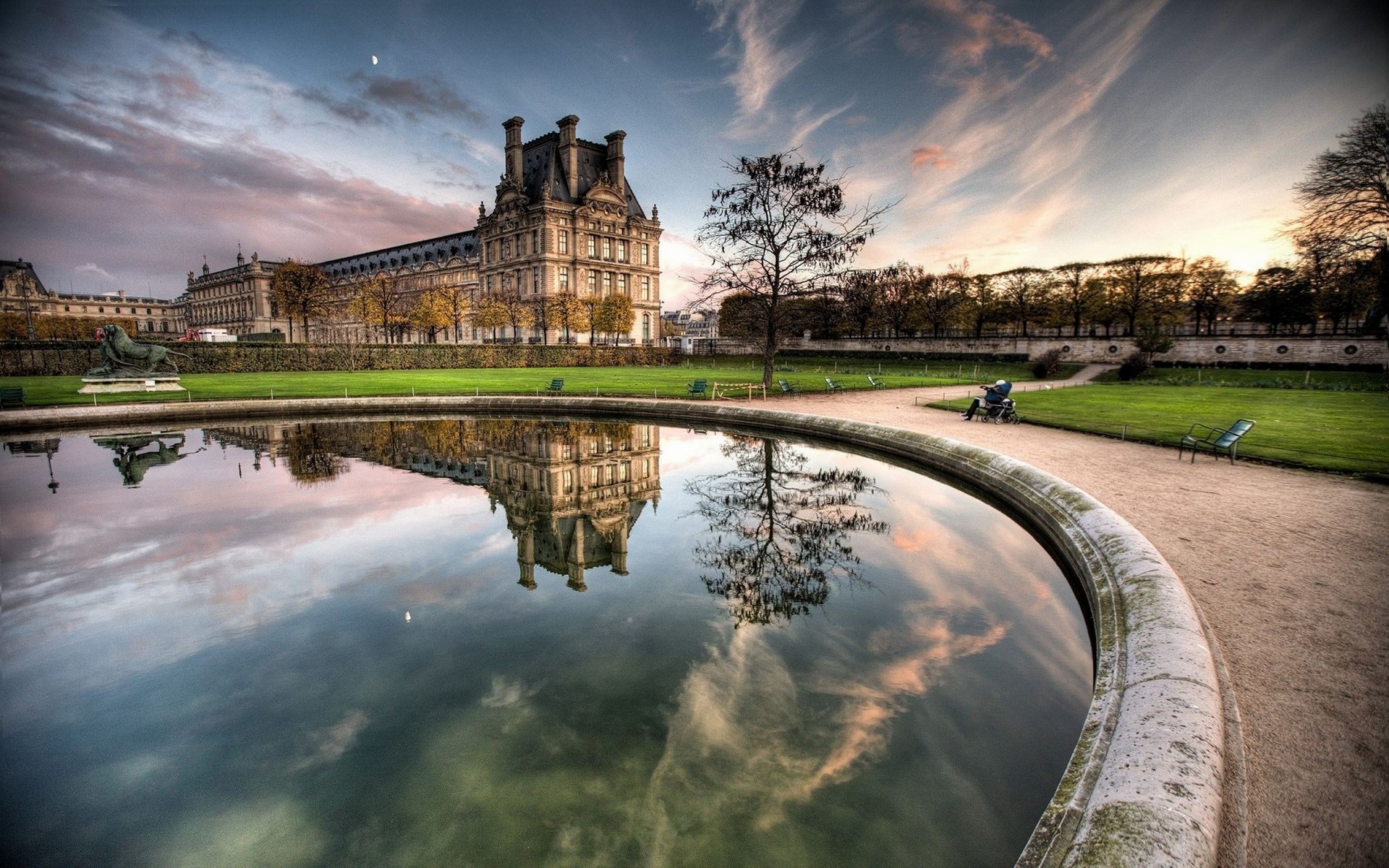

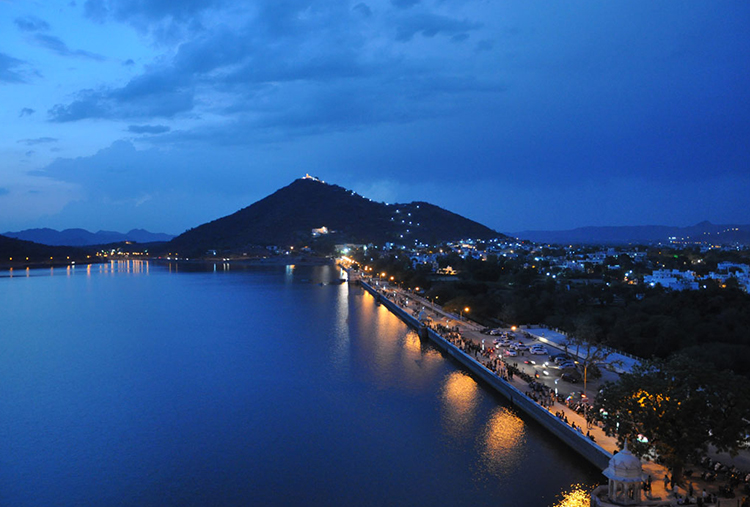
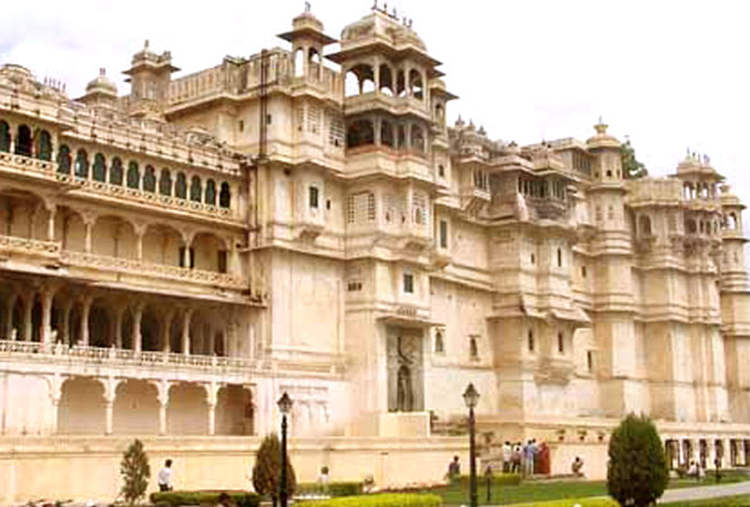

DAY 01 – AHMEDABAD – UDAIPUR (250 KMS)
Arrive Udaipur and transfer to your hotel.
Set on the shores of Lake Pichola and surrounded by hills, Udaipur grew in complete contrast to the harsh deserts of the rest of Rajasthan. As capital of the old Mewar State it was the only Rajput stronghold to uphold its Hindu allegiance in the face of Muslim invasion. This fairy – tale city, with its marble palaces and lakes surrounded by a ring of hills, was founded by Maharana Udai Singh in 1559. The city is dominated by massive City Palace, which overlooks Lake Pichola with its romantic island palaces. Picturesque havelis, ghats and temples line the lake front, with the lively bazaars of the old walled city stretching behind them.
Overnight at Hotel
DAY 02 – IN UDAIPUR
After breakfast proceed for half day city tour of Udaipur – visiting the City Palace and Museum. The largest palace complex in India, it is a blend of Mughal and Rajput influences. Also see the 17th century Jagdish temple, drive around the Fatehsagar Lake, and visit the Sahelion ki Bari (the Garden for the Maids of Honour), an ornamental pleasure garden with fountains and marble kiosks. Later visit the Bharatiya Lok Kala Mandir or the Folk Art Museum.
Later in the evening take a boat ride on the 4 km long and 3 km wide Lake Pichola, which is fringed with hills, palaces, havelis, ghats, embankments and temples and offers spectacular views of the city. Visit the Jag Mandir Island with its exquisite Gul Mahal Pavilion.
Overnight at Hotel
DAY 03 – UDAIPUR TO JODHPUR (300 KMS)
After breakfast drive to Jodhpur enroute visiting Ranakpur – is the largest Jain temple complex in India and dates to the 15th century. The main temple is dedicated to Adinath, the first Tirthankar. Intricate carvings detail mythological figures, patterns and motifs on the walls, pillars and domes. There are 1444 ornately carved marble pillars in the complex and none of them are similar. The beautiful lace-like interiors of the domes are a superb example of western Indian temple style. Surya temple and other Jain temples are side attractions. (Temples open only at 1200 Hrs. Leather belts, footwear, bare legs and black clothing not allowed)
Later continue to drive to Jodhpur – Arrive to the Blue City – Jodhpur and transfer to your hotel.
An oasis in the arid Thar Desert, Jodhpur is the second largest city in the state of Rajasthan. Representing this colourful city with shades of blue, Jodhpur has a history that is rich and a present that beckons strongly to the discerning tourist. Forts and palaces, temples and havelis, culture and tradition, spices and fabrics, colour and texture, Jodhpur has them all and in plenty. Situated in Western Rajasthan, Jodhpur has long attracted both the domestic and outside tourist. It not only offers tangibles, in terms of what you can see and buy but also fills one with a sense of history and the splendours of an era gone by. The hospitality of the locals, the demure women, and the colourful turbans -all set against the beloved desert (Marwar) is something to feel, not just see. Every pore of Jodhpur tells its own tales of heroic deeds that made legends out of kings and soldiers, romances that continue to warm the heart and a time when epics were lived out on the streets by everyday man.
Overnight at Hotel
DAY 04 – JODHPUR – JAISALMER (300 KMS)
After breakfast proceed for city tour of Jodhpur visit the Meherangarh Fort, situated on a low sandstone hill. The palace apartments like Sukh Mahal, Phool Mahal, and Sheesh Mahal etc are beautifully decorated and house Jewellery, costumes, armoury, palanquins, howdahs and other remnants of the past. See the Jaswant Thada, an imposing marble memorial to Maharaja Jaswant Singh II built in 1899. Later the royal crematorium and three other cenotaphs were also built here.
Later drive to Jaisalmer; Arrive Jaisalmer and transfer to your hotel. Jaisalmer – a fairy-tale town in the Thar Desert founded about 800 years ago by Jaisal. Unlike any other city, this desert fortress is one of Rajasthan’s most exotic and unusual towns. Jaisalmer, an important ancient trading centre because of its strategic location on the camel trade routes, is often described as the ‘golden city’. The annual desert festival takes place in January and February each year and is a riot of colour and activity. Jaisalmer is also famous for its embroidery, Rajasthani mirror work, rugs, and blankets, antique, silver jewellry, and stonework and camel safaris.
Overnight at Hotel
DAY 05 – JAISALMER – SODAKORE MIRVANA TENTS (55 KMS)
After breakfast leave for the city tour of Jaisalmer. Visit the famous Havelis (mansions) known for their frescoes. Jaisalmer’s strategic position on the camel terrain route bought it great wealth. The merchants grew prosperous and commissioned great havelis, or mansions, to flaunt their ever-growing status in society. Made of local golden-yellow sand stone and wood, some of the havelis are still in excellent condition. The most elaborate and magnificent of all the Jaisalmer havelis is the Patwaon Ki Haveli. Five Jain brothers built the Haveli between 1800 and 1860. Salim Singh Ki Haveli and Nathmal Ki Haveli are the other two havelis that are opened to visitors.
Built in 1156 by the Bhatti ruler, Jaisal, THE FORT here stands atop the 80 m high Trikuta hill. 3 walls and features 99 bastions surround the fort. Over the centuries, the golden sand stone fortress witnessed many battles between the Bhatti Rajput’s, the Mughals and the Rathore’s of Jodhpur. Within the fort complex lie the beautifully carved Jain Temples built between the 12th and 15th centuries. This house is priceless ancient manuscripts and other exhibits like astrological charts, besides the Jain equivalent of the Christian Shroud of Turin.
In the evening, proceed for the excursion to Sam Sand dunes. Located at a distance of 42 kilometers from Jaisalmer, Sam Sand Dunes is the closest point to witness the total sandy desert. You can also see the patterns and motifs created by the shifting sands and air. Moreover, Sam Sand Dunes also provide you with an unforgettable experience of camel rides and the sunset.
Overnight at Tented Accommodation
DAY 06 – SODAKORE – JODHPUR (230 KMS)
After breakfast drive to Jodhpur; Arrive Jodhpur and transfer to your hotel. Afternoon is free to walk around in the colourful and bustling bazaars for personal exploration or shopping.
Also visit Sardar Bazaar and Clock Tower markets where you can see the vegetable, spice, Indian sweets, and textile and silver markets. These colourful markets with tiny shops dot the narrow lanes replete with woodcarvings, wrought iron, lacquer work, silver and ivory ornamentation and leather handicrafts.
Overnight at Hotel
DAY 07 – JODHPUR – MOUNT ABU (300 KMS)
After breakfast drive to Mount Abu; Arrive Mount Abu and transfer to your hotel
At 1200 meters, Mt. Abu is the highest point of the Aravalli Range passing through Rajasthan. The only hill resort of Rajasthan, it is built around a lake and is surrounded by forested hills. According to a legend, the place derives its name from Arbuda, a serpent who descended to the spot to rescue Shiva’s bull, Nandi. Besides having all the features of a pleasant hill resort, Mount Abu is also a centre of pilgrimage for Jains on account of the famous Dilwara Temples. There are interesting treks and picnic spots, romantic royal retreats of various erstwhile royal families, and some relics of the Raj period.
Later proceed for city tour of Mount Abu. Visit the breath taking Dilwara temples, among the finest examples of Jain architecture with their superb marble carving. The complex consists of five temples built between the eleventh and thirteenth century. The intricate ornamental carvings here represent the great heights reached in stone decoration. Also visit Nakki Lake, and see the strange rock formations around it including Toad Rock. The Achalgarh fort has the famous Achaleshwar temple and also provides superb views of the area.
Overnight at Hotel
DAY 08 – MOUNT ABU – AHMEDABAD (250 KMS)
After breakfast drive to Ahmedabad; Arrive Ahmedabad and in time transfer to Jaipur Airport / Railway Station to board your flight / train for onward destination
Hotels Accommodation
Mail as per Itinerary
Economy Air Ticket
Tourist VISA
Travel Insurance
There is no content
1) Ahmedabad, in western India, is the largest city in the state of Gujarat. The Sabarmati River runs through its center. On the western bank is the Gandhi Ashram at Sabarmati, which displays the spiritual leader’s living quarters and artifacts. Across the river, the Calico Museum of Textiles, once a cloth merchant’s mansion, has a significant collection of antique and modern fabrics.
2) Udaipur, formerly the capital of the Mewar Kingdom, is a city in the western Indian state of Rajasthan. Founded by Maharana Udai Singh II in 1559, it’s set around a series of artificial lakes and is known for its lavish royal residences. City Palace, overlooking Lake Pichola, is a monumental complex of 11 palaces, courtyards and gardens, famed for its intricate peacock mosaics.
3) Jodhpur is a city in the Thar Desert of the northwest Indian state of Rajasthan. Its 15th-century Mehrangarh Fort is a former palace that’s now a museum, displaying weapons, paintings and elaborate royal palanquins (sedan chairs). Set on on a rocky outcrop, the fort overlooks the walled city, where many buildings are painted the city’s iconic shade of blue.
4) Jaisalmer is a former medieval trading center and a princely state in the western Indian state of Rajasthan, in the heart of the Thar Desert. Known as the “Golden City," it’s distinguished by its yellow sandstone architecture. Dominating the skyline is Jaisalmer Fort, a sprawling hilltop citadel buttressed by 99 bastions. Behind its massive walls stand the ornate Maharaja’s Palace and intricately carved Jain temples.
5) Mount Abu is a hill station in western India’s Rajasthan state, near the Gujarat border. Set on a high rocky plateau in the Aravalli Range and surrounded by forest, it offers a relatively cool climate and views over the arid plains below. In the center of town, Nakki Lake is a popular spot for boating. Close by are the centuries-old Dilwara Temples, ornately carved from white marble and of great spiritual importance.
Special Offers
